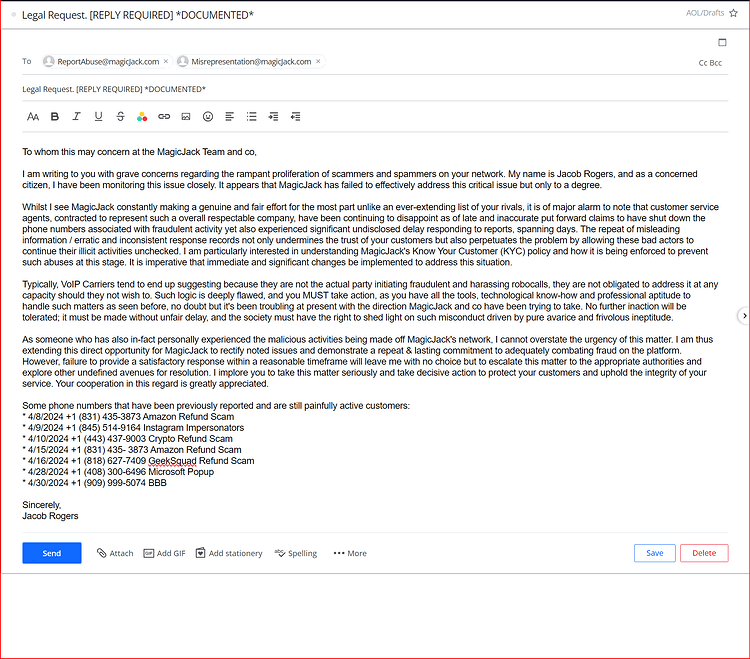I have to respectfully disagree with you on multiple accounts. It is fairly obvious that US telecom industry has become extremely dysfunctional due to lack of government oversight, extreme deregulation and presence of special interest groups. There is also one underlying theme here - lack of accountability and lack of enforcement.
This issue of illegal robocalls is very unique to the North American and - to some extent - UK market. I have traveled extensively and lived in several countries overseas. Robocalls and scam calls are a rather minor issue there. In fact, in nations like Sweden, Germany and few others they barely even exist. Yes, these are less populous nations than the US, but EU as a whole is far from tiny. I do know that their telecom industry is a lot more regulated. There are great articles about it on Commsrisk.
I do not think that proposing a strong and stern political solution is unrealistic. We can write mass petitions, vote for the right candidates and find ways to spread the message by collaborating with journalists, regulators and other groups. I can tell you that I personally was able to shut down quite a few scammers by relentlessly emailing a multitude of State, local, Federal regulators as well as some individuals within the ITG and Anti-Robocall Taskforce. Naturally, I was always respectful and professional in my communication with them. Yes, I’m just a regular person and I’m often ignored by these individuals. However, I am not giving up, and I have seen telecom held accountable.
By the way, I have never said that telecoms are equated to terrorists. There are reputable telcos that take immediate action on reports. I have compared foreign (and domestic) scammers to terrorists. I am not taking my words back. Their harassing and illegal behaviors cause immense hardships, pain and suffering on some of the most vulnerable people - the elderly, disabled and impoverished persons. I have no compassion for these criminals.
While I am not familiar with your group and do not have anything critical to say about it, I think you may overestimate the ethical and law-abiding nature of several foreign enterprises calling the US public. Same is true of some VOIP telecom. I think there is a trend with some of them of turning a blind eye to illegal activities due to several factors. After all, they do make money off selling and leasing telephone numbers to their foreign resellers, some of which are not reputable. We have been seeing a significant increase in warning notices sent to VOIP carriers by the FTC and FCC, and I think there are valid reasons for it.
I don’t think I would be exaggerating by saying that MOST American people have no interest in Indians, Pakistanis or other foreign persons calling them. There is simply no logical need for it, in most cases. I definitely would not be upset if there was a way to make my phone number completely inaccessible to all foreign callers. Unfortunately, it is impossible, as they use local numbers and spoof. Yes, I am aware that there are domestic scammers too, but they are easier to catch. In fact, we should be learning from nations like Ireland (I applaud them for banning foreign callers from using Irish numbers!)
https://commsrisk.com/regulator-rebuffs-twilio-suggestion-that-foreign-teleworkers-might-use-irish-phone-numbers/
Furthermore, we cannot underestimate the power of litigation and societal pressure on telecom. I can tell you that via litigation, legal notices and demands as well as emails to executive leadership, I personally was able to place universal block on my cell phone number with some providers that are frequently utilized by foreign telemarketers and scammers. Yes, I realize that it might prevent legitimate callers from reaching me, but it is okay with me. I communicate a lot via electronic means, such as IMs and emails, and I am fine with accepting this minor risk. On the positive side, I have seen a tremendous reduction in the number of robocalls placed to my telephone number. In my opinion, it is a rather small number of telcos that are frequently used by scammers and spammers. I have also seen it when telcos eventually took action against scammers after multiple people put pressure on them. I think we cannot underestimate the power of organized collective efforts, as it comes to holding telecom and illegal telemarketers accountable (within legal means).
There is currently a wonderful lawsuit in Federal court titled Mey vs. All Access Telecom. Should Diane Mey win this lawsuit, it would create a powerful precedent. It would imply that we - regular citizens - would be able to sue telecoms turning a blind eye to robocalls and scams. And it would be absolutely epic! It would be a step in the right direction of protecting regular people from annoying and obnoxious scammers.
@Jhawk @MajorLeeAwesome - I apologize in advance for including you in this post, but I think you guys share some of the same experiences that I shared here. It’s ridiculous that we let a few nasty non-compliant greedy telcos profiting off Indian and Pakistani scammers hold the entire country hostage!

